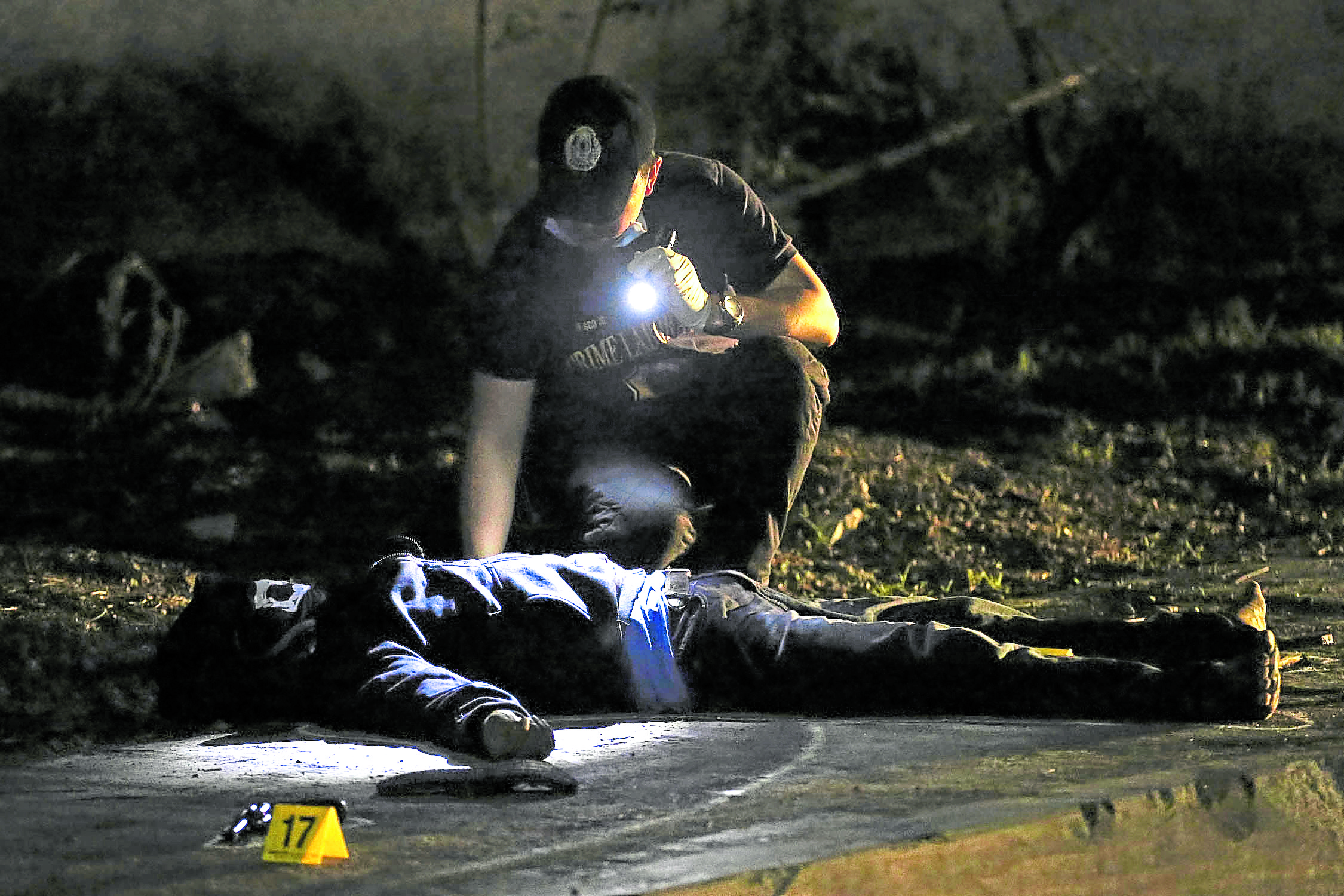
FILE PHOTO: A police investigator inspects the body of a suspected victim of extrajudicial killing. INQUIRER FILES
President Marcos has called Chief Presidential Legal Counsel Juan Ponce Enrile and other top administration lawyers to a meeting on the cases filed against his predecessor Rodrigo Duterte in the International Criminal Court (ICC) alleging crimes against humanity in the war on drugs.
Solicitor General Menardo Guevarra, who was also at Wednesday’s meeting, told reporters on Thursday that the “only agenda was the government’s position on the ICC investigation” of the charges against the former president.
He declined to give details of their discussions, saying he’d rather leave it to Marcos to make any disclosure.
The public got wind of the meeting after former Duterte spokesperson Harry Roque posted a picture of those who attended it on his Facebook page on Wednesday night.
In addition to Enrile, Guevarra and Roque, the picture showed Justice Secretary Jesus Crispin Remulla, Executive Secretary Victor Rodriguez, and Foreign Secretary Enrique Manalo seated at a wooden table with the President at the head.
‘Fundamental interest’
Asked whether the Marcos administration was legally obliged to engage with the ICC even though the investigation concerned Duterte, Guevarra said: “The state, as distinguished from the government or its officials, whether past or present, has fundamental interest in the ICC case.”
Duterte and several other members of his administration had been charged in the ICC with multiple murder as part of the allegation that they committed crimes against humanity for the thousands killed in his brutal drug war.
The ICC suspended the probe last year at the request of the Philippine government.
On July 14, the ICC Pre-Trial Chamber requested the Philippine government and the complainants to comment on the reopening of the investigation proposed on June 24 by ICC Prosecutor Karim Khan.
The ICC asked the government and the families of the drug war victims to submit their comments by Sept. 8.
Speaking to reporters on the sidelines of a Rotary Club of Manila meeting on Thursday, Remulla insisted that the ICC had no jurisdiction over the Philippines after the country withdrew its membership from the court.
“They say that they want to investigate crimes here in the country, but we have a functioning judicial system. It’s not perfect but it’s functioning,” he said.
Earlier, he said that the Department of Justice (DOJ) was busy collating data and the results of its investigation of the drug war.
“If they ask for a report, we will give them a report … out of our friendship with them, out of decency,” he said. “But for us to say that we are under them I think is another matter. This has to be threshed out properly in international law.”
Remulla refused to comment when asked whether rejoining the ICC was discussed during the meeting.
Roque, a former human rights lawyer who ran for senator under the Marcos slate in the May 2022 elections, said he attended the “productive meeting.”
“I confirm that I have been retained as private counsel of PBBM (President Bongbong Marcos) for the princely sum of 20 pesos. As such, all my conversations with the President on legal matters are covered by atty-client confidentiality,” he said in a Facebook post on Thursday.
Asked what matters were discussed during the meeting, Roque told the Inquirer in a Viber message that everything was “confidential” and that he had “no authority to speak.”
In a press conference on Thursday, Department of Foreign Affairs (DFA) spokesperson Ma. Tereza Daza said the DFA, as conduit of information from the ICC, was coordinating with the DOJ and Office of the Solicitor General (OSG) on the government’s next move.
Daza said the government was committed to fighting impunity despite its withdrawal from the Rome Statute, which established the ICC.
The Philippines withdrew from the treaty in 2018 after Khan’s predecessor Fatou Bensouda opened a preliminary examination of the charges against Duterte. The withdrawal took effect on March 17, 2019.
“The Philippines underscores that it has the primary jurisdiction to investigate and prosecute the crime against humanity allegedly being committed in the anti-illegal drugs campaign,” Daza said.
“As the court of last resort, the ICC complements but does not replace the national courts. It only operates in cases where national jurisdictions are unable or unwilling to prosecute,” she added.
Asked whether there were plans for the country to rejoin the ICC, Daza said this would be subjected to consultations with the DOJ and OSG, the lead agencies concerned.
Rodriguez and Press Secretary Trixie Cruz Angeles did not respond to repeated requests for details and comments regarding the meeting.
Roque was part of a group that strongly pushed for the ratification of the Rome Statute by the Philippines.
The Senate ratified the treaty in 2011. Then Senate President Enrile was the only senator who voted against ratification.